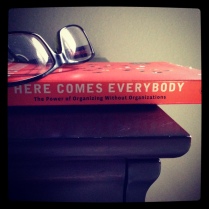 When people learn that I have Muslim friends, it tends to elicit questions that are based on anger and fear. I am struck by the anxiety that is produced in normally thoughtful people by sensationalism in the media. “But I read that…”
When people learn that I have Muslim friends, it tends to elicit questions that are based on anger and fear. I am struck by the anxiety that is produced in normally thoughtful people by sensationalism in the media. “But I read that…”
No doubt you’ve heard it said: “Don’t believe everything you see in print. Just because it’s written down, doesn’t make it true.” That message was hammered home to me recently, while I was reading Here Comes Everybody by Clay Shirky.
Shirky wrote about our need to think differently. “We have historically relied on the publisher’s judgment to help ensure minimum standards of quality. Where publishing [was] hard and expensive, every instance of the written word [came] with an implicit promise: someone besides the writer thought this was worth reading.”
The world of publishing has undergone radical changes in the last ten years. Unfortunately, those of us who remember the way it used to be, have done little to revise the old-fashioned way we treat the information that we consume.
Freedom to Publish Requires Readers to Filter
A few months ago, I signed up for an account on WordPress online and selected a free blogging theme. I didn’t have to ask a real person’s permission – I just filled out and submitted a form. The message that you’re now reading cost me next to nothing to present to you, and it was very simple for me to put together. I haven’t consulted anybody else’s opinion (except my wife’s, of course. She’s an excellent editor) before pushing the “publish” button.
I do hope you will engage your own sense of discernment before you act on the truth that I offer you. Likewise, most of what you read these days has to be considered carefully and sifted through your own common sense sniffer.
Shirky describes the new way we must engage information. “Filter-then-publish, whatever its advantages, rested on a scarcity of media that is a thing of the past. The expansion of social media means that the only working system is publish-then-filter.”
Personalized Search
Unfortunately, the very tools we think we’re using to filter are working against our individual abilities to discern.
Did you know that Google provides you with different search results than someone else is likely to get? No. Really. Google is trained to follow your own biases, based on the things you’ve chosen from past searches.
When you’re logged into your Google account on your computer, Google Web History is recording the links you click on that result from a search. The next time you perform a Google search, advanced mathematical algorithms “help you” by providing a customized set of results that are likely to reflect your previous personalized choices.
So whatever prejudices you have, they’re likely to get stronger. Google will feed you a solid diet of what you chose in the past without letting you know there are other opinions.
Do you think this may have repercussions on society? Ayup.
So the next time you read something that stirs up anger and fear, take a deep breath and ask yourself how trustworthy you know your source to be. How does it relate to your personal experience or lack thereof? Do you know someone you can ask who is more reliable?
If you want a different perspective on what it’s like to befriend Muslims, read my book Coffee & Orange Blossoms: 7 Years & 15 Days in Tyre, Lebanon. Trust me. It’s good. Even though I published it entrepreneurially. Come on, it has to be good if you can get it on Amazon!
…oh, and turn off personalized search if you want to think for yourself.


